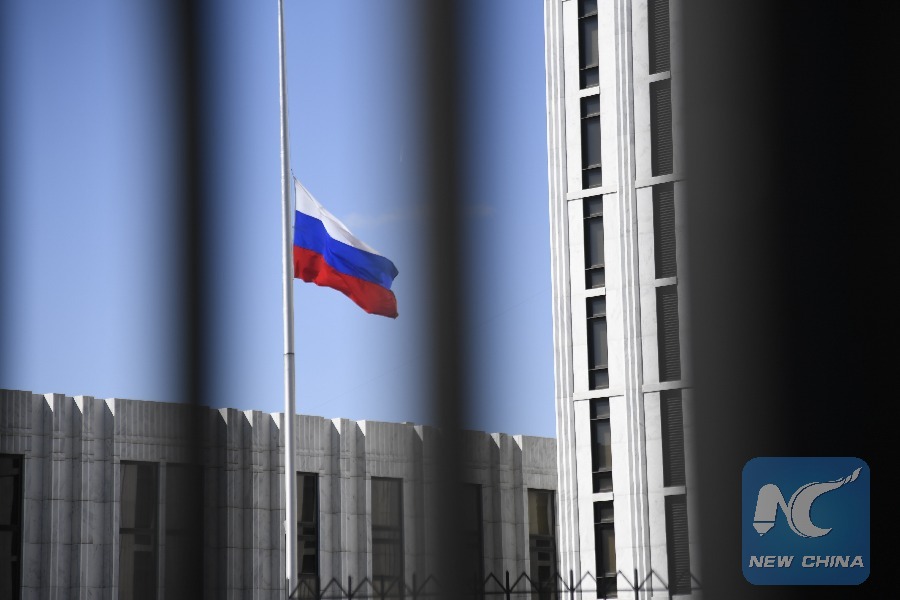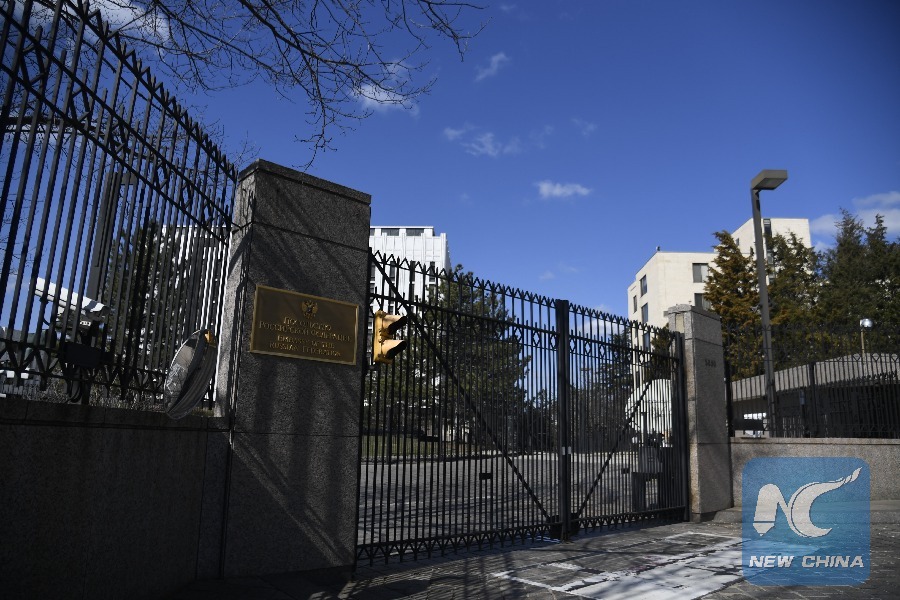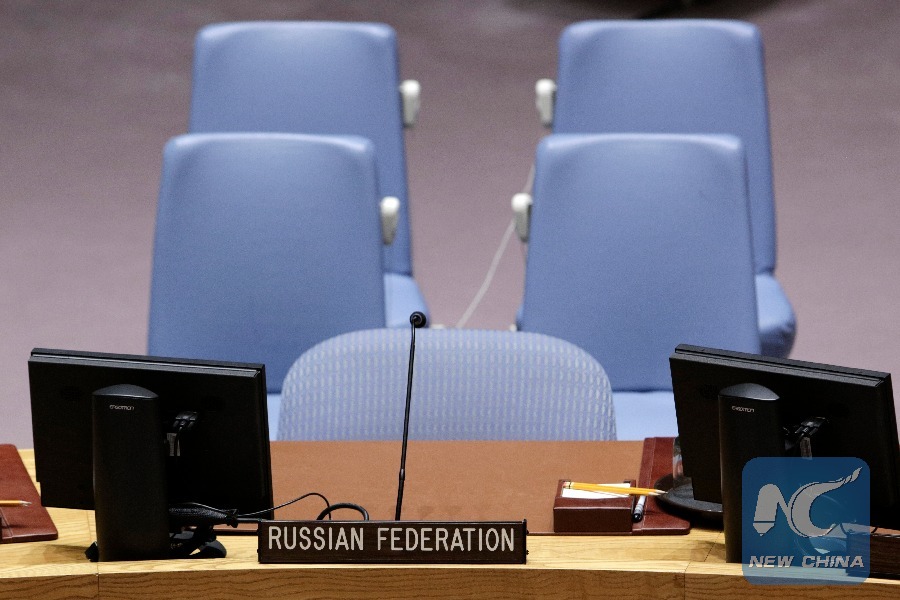
Photo taken on March 26, 2018 shows the Russian national flag at Embassy of Russia in Washington D.C., the United States. U.S. President Donald Trump has ordered the expulsion of 60 Russian diplomats and intelligence officials, and the closure of the Russian Consulate in Seattle in response to the poisoning of a Russian ex-spy in Britain earlier this month. (Xinhua/Yang Chenglin)
BEIJING, March 27 (Xinhua) -- Russia has vowed to retaliate in kind after more than 20 Western nations decided to expel Russian diplomats over Moscow's alleged involvement in the poisoning of a former Russian spy and his daughter by using a chemical weapon early this month.
Until now, at least 24 nations, including the United States and 17 European Union (EU) members, have said they would repatriate Russian diplomats in their countries, citing the envoys' "spying activities" and bringing the total number of expelled Russian diplomatic personnel to over 100.
The moves are a concerted response by the West to a March 4 incident in which Sergei Skripal, formerly a Russian intelligence officer who was later convicted in Russia of spying for Britain, and his daughter Yulia Skripal were found unconscious on a bench in a shopping center in the southern English city of Salisbury. The two remain in the hospital in critical condition.
Britain accused the Kremlin of masterminding the attempted murder of the two Skripals by employing a Soviet-era, military-grade nerve agent Novichok.
The Russian government fiercely denied any role in the case and, in its latest response to what appeared to be the biggest diplomatic row between it and the West, called the deportations "a provocative gesture." It vowed to retaliate with tit-for-tat measures, pending the ultimate decision by President Vladimir Putin.
COLLECTIVE RESPONSE
U.S. President Donald Trump on Monday ordered the expulsion of 60 Russian officials in the United States whom Washington determined to have been spying.
The Russian envoys to be expelled are 12 officials from the Russian mission to the United Nations (UN), 46 diplomats from the Russian Embassy in Washington, as well as another two from the consulate in New York, according to a report by Russia's TASS news agency citing Russian Ambassador to the United States Anatoly Antonov.
In addition, Washington had told Moscow to shut down its consulate in Seattle, Russia's only remaining consular facility on the U.S. West Coast after the forced closure by the United States of the Russian consulate in San Francisco in August last year.
U.S. State Department Spokesperson Heather Nauert said the Russian officials will have to leave within a week as they "have abused their privilege of residence in the United States."
The White House said in a tweet Tuesday that the diplomatic expulsion and the closure of the Russian consulate in Seattle are steps showing that "the United States and our allies and partners make clear to Russia that its actions have consequences."

Photo taken on March 26, 2018 shows the gate of Embassy of Russia in Washington D.C., the United States. U.S. President Donald Trump has ordered the expulsion of 60 Russian diplomats and intelligence officials, and the closure of the Russian Consulate in Seattle in response to the poisoning of a Russian ex-spy in Britain earlier this month. (Xinhua/Yang Chenglin)
Also on Monday, European Council President Donald Tusk announced that a total of 14 EU countries decided to expel Russian diplomats in response to Skripal's poisoning, teaming up with fellow member Britain which earlier this month sent back 23 Russian diplomats and freezed Russian assets. The number has risen to 16 now.
Tusk told reporters in Varna, Bulgaria, that the European Council condemned in the strongest possible terms the attack in Salisbury and agreed with London's assessment that Russia should be held accountable. He left open the possibility of further punitive measures within the EU framework.
Among the 16 EU members which just announced their decisions, France, Germany and Poland would each expel four Russian diplomats with alleged intelligence backgrounds. Lithuania and the Czech Republic said they would expel three, while Denmark, Italy, the Netherlands and Spain would each expel two.
Croatia, Estonia, Finland, Hungary, Latvia, Romania and Sweden would each expel one Russian envoy, while Iceland said it will boycott the upcoming FIFA World Cup in Russia by not sending officials to the soccer event.
Another 22 Russian diplomats were expected to be sent home from non-EU countries including Albania, Australia, Canada, Norway and Ukraine. The countries said either that the officials' activities are inconsistent with their diplomatic status or that the Skripal incident must have consequences.
Among these non-EU countries, Albania, Canada and Norway are members of the North Atlantic Treaty Organization (NATO), which Russia has repeatedly accused of encroaching on its borders. Albania and Macedonia are candidates for EU membership, while Ukraine has been in hostile relations with Russia since domestic conflicts erupted in 2014.
British Prime Minister Theresa May welcomed the moves by her country's allies by hailing the "great solidarity" with Britain shown by the EU, North America, NATO and beyond.
May said in a statement in the House of Commons that what happened was "the largest collective expulsion of Russian intelligence officers in history."
"And together we have sent a message that we will not tolerate Russia's continued attempts to flout international law and undermine our values," she added
Despite the seemingly unified confrontational stance on Russia, there have been voices within the aforementioned countries calling for dialogue.
German Foreign Minister Heiko Maas said "we remain open to constructive dialogue with Russia, which remains necessary on many international issues."
Finnish President Sauli Niinisto said on Monday that resources should be now focused on mending the rift between the East and the West that appeared to have widened now. Meanwhile, Finnish Prime Minister Juha Sipila told a separate press conference on the same day that the decision to expel a Russian diplomat was not easy for the country.
"PROVOCATIVE GESTURE"
Commenting on the latest development of the diplomatic standoff, Dmitry Peskov, spokesman for the Kremlin, said Monday Russia deeply regretted the decisions taken by the West, reiterating that Moscow "has never had any relation to this case (Skripal's poisoning)."
"Such incidents did happen in the past," Peskov said in reference to the Western nations' expulsions of Russian diplomats. "It is not the collective nature of the steps that really matters but the fact they are wrong," he said in remarks carried by the TASS.
According to Peskov, Russia will respond in accordance with "the principle of reciprocity." He said the Russian Foreign Ministry was tasked with analyzing the situation and would submit proposals to President Putin, who would ultimately decide the retaliatory measures.

Photo taken on March 26, 2018 shows empty seats for the Russian delegation in the United Nations Security Council chamber after an UN Security Council meeting on the situation in the Middle East at the UN headquarters in New York. The UN Secretariat has received the U.S. decision to expel 12 diplomats of the Russian mission to the world body, said a UN spokesman on Monday. (Xinhua/Li Muzi)
The Russian Foreign Ministry called the expulsions a "provocative gesture," vowing to take countermeasures on a country-by-country basis.
"There will be a response to everything we saw today," said Foreign Ministry spokesperson Maria Zakharova, according to the TASS. "Appropriate measures will be taken on each country, both regarding the expulsion of diplomats and the closure of the Russian Consulate General in Seattle."
Previously, responding to Britain's deportation of 23 Russian diplomats earlier this month, Russia ordered an equal number of British diplomats out of the country. It also asked London to close its consulate in St. Petersburg and cease operations of the British Council in Russia.
"The task was to demonize Russia and what we are witnessing now is part of a long-term program of unbridled Russophobia," Zakharova said Monday in an interview with the Rossiya-1 television channel.
While accusing NATO of being behind the EU's decision to expel Russian diplomats, the spokesperson alleged that "powerful forces" in Britain and the United States were behind the attack on Skripal and were "real beneficiar(ies) of the whole situation," according to the TASS report.
Russian Ambassador to the United States Antonov said Monday that the U.S. decision to expel 60 Russian diplomats is ill-considered and provocative, adding the move is "ruining what has left of Russia-U.S. ties."
He warned that the United States would bear responsibilities for the consequences of the expulsion of Russian diplomats and the closure of the Russian consulate, adding the diplomats to be expelled would either relocate to other Russian diplomatic facilities in the United States or return home.

